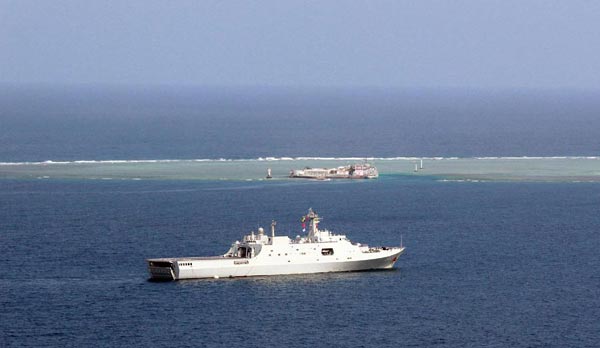 |
|
A formation of the Nanhai Fleet of China's Navy on Saturday finished a three-day patrol of the Nansha islands in the South China Sea. [Photo/Xinhua] |
In this year's "shoulder-to-shoulder" military exercises between the United States and the Philippines, Australia is sending 80 soldiers to participate, and Japan has sent two frigates and one submarine, showing its eager desire for larger involvement.
The increasingly open intervention of external forces in the South China Sea and the emergence of signs that an alliance is being formed add even more uncertainties to the situation.
Due to China's self-restraint, up to now territorial disputes and frictions over maritime rights in the South China Sea have been generally under control. The Declaration on the Conduct of Parties in the South China Sea signed between China and relevant Southeast Asian nations and talks on the making of a code of conduct had made the easing of tensions a general trend.
Yet the forcible intervention of the US and the involvement of Japan and Australia are transforming the South China Sea into an arena for the power games and accumulating military risks for the broader Asia-Pacific. This is because the US seems to be taking the South China Sea as a key area where it can contain China's rise and build a China-targeted Asia-Pacific alliance or quasi-alliance.
Compared with Australia, whose participation in the US-led military activities in this region is to a certain extent due to its military alliance with Washington, Japan has shown much more interest in the South China Sea. In Tokyo's eyes, its involvement can not only contain China but also offer a good starting point for its Self-Defense Forces to conduct a larger range of military operations overseas. It is foreseeable that Japan will have more overt and semi-overt military intervention in the South China Sea.
The deeper involvement of external forces such as the US and Japan is turning the South China Sea into a wrestling ring for power and reducing the possibility of peaceful settlement.

I’ve lived in China for quite a considerable time including my graduate school years, travelled and worked in a few cities and still choose my destination taking into consideration the density of smog or PM2.5 particulate matter in the region.
